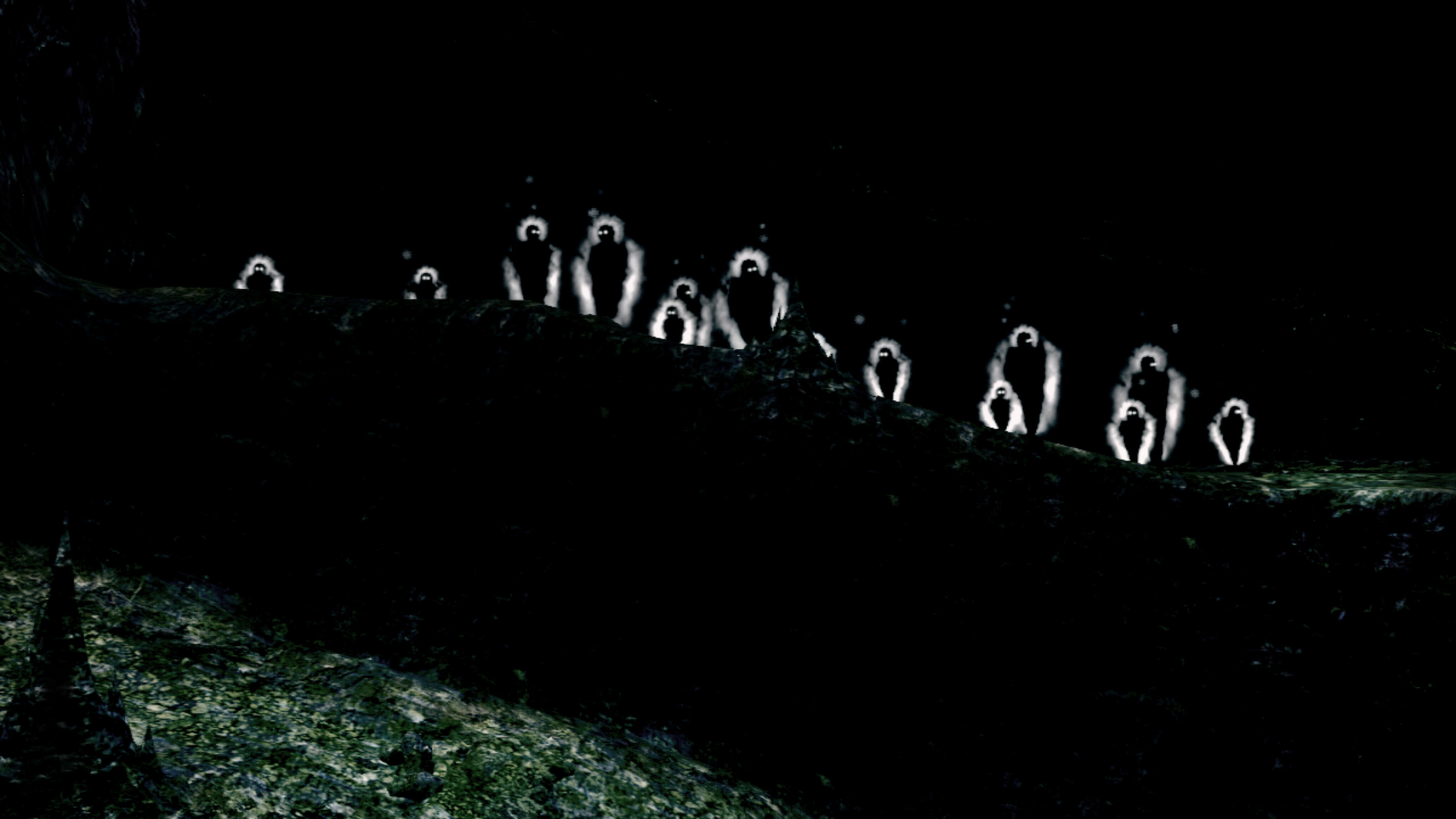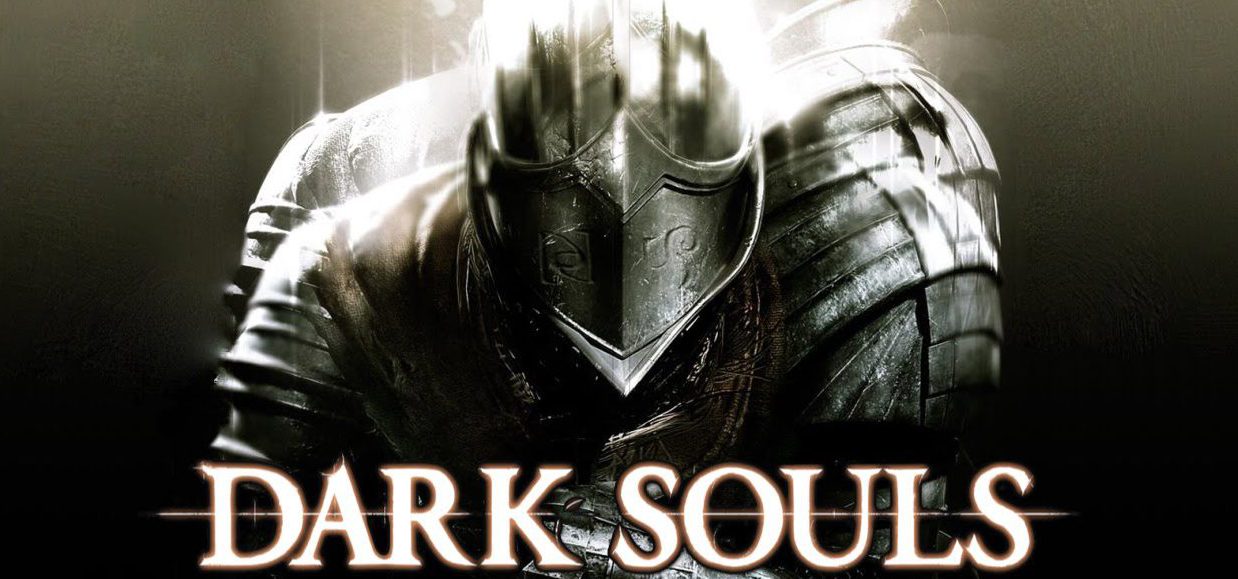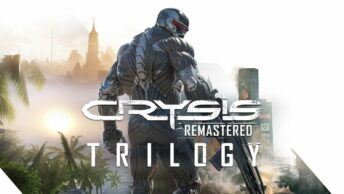Before It Was a Meme, It Was a Masterpiece.
Released: Steam
Type: Single-player
Genre: Action
Developer: FromSoftware
Publisher: BANDAI NAMCO
Release date: 22 Sept, 2011
Thus Began the Age of Fire…
At first, it was likely melancholy.
Then, slowly, whatever it was began gripping tighter. Eventually a sentiment of emptiness crept in, and in time—dread. I had no hope of progressing. I already knew that. The loud clanging of crossbow bolts and the cold stretching sounds of the machines being loaded and fired were sufficient enough reason to keep me holed up. It had been an achievement, really, that I had gotten this far. And gazing into the bonfire, where I was sure I was safe, was too much of a respite to continue what had really only been a short-lived adventure. Escaping the Asylum and landing myself in Lordran had been accomplishment enough, I reasoned, for a game with this kind of reputation. Even after being mocked by that Crestfallen Warrior, some progress had indeed been made. Lighting this current bonfire was evidence of that. But now any confidence I had gained was all gone. I was frozen, too craven to step back out into the Undead Burg, too intimidated to do much of anything, honestly. Then I remembered something I had heard. Something from one of the Warrior’s vapid pontifications. He had told me, I remembered, “You are not the first.” Suddenly I didn’t feel so alone anymore.
I readied my shield. And I stepped out past the bonfire toward whatever else lie waiting…

Those familiar with Dark Souls will understand all of what I wrote above. Not just the emotion of it; they will understand the geography. They will understand the enemy. They will understand the flesh of it. Because they lived it. They were “not the first.”
While it had been a sequel, spiritually or otherwise, to the less-played and less-pervasive Demon’s Souls, Dark Souls marked a more prominent coming. There had been few events in gaming history that had done so much to evolve the medium. Upon its release in 2011, Dark Souls set the world on fire and changed the landscape of gaming for at least a decade to follow. What could have easily faded away as something of a sideshow freak instead took on life. There were only whispers at first, certainly not the kind of fanfare one expects from current popular media whose reviews and previews have become indistinguishable from promotional material. These whispers said something of “difficulty,” the likes of which might border on sadomasochism. Part of the marketing? Sure. Still not really my cup of tea. Easy pass.
But now I was here and what had I done? I was in for it now. Clearing the aqueducts and making my ascent through The Burg had only achieved a standstill. All I had was this bonfire to sit by, bearing witness to my lonely debate about having gone too far to advance and too far to retreat. Before I had gathered the courage to move forward, I had poked my head out from past the bonfire, but never for too long. I was just too afraid to die. But why? It’s just a video game. Yet the fear of dying had kept me from playing, living. The risk of losing progress was denying me any chance for success. Lofty, sure, but it wasn’t long before I began to understand that majestic expressions of a philosophical nature were exactly what was expected of me. I was meant to feel afraid, alone, and naked. The person holding the controller in my living room was, at once, the same poor wanderer in Lordran. How could I overcome?
Synonymous with excellent storytelling, great theming should make up healthy portions of any great video game’s recipe. Even lacking in good theming, bad video games still have goals, parameters, and expectations. There is usually a start point and an end point, and something to achieve, the satisfaction of which is rewarded with something amounting to an ending. Dark Souls was the first event that had gone beyond mere themes, beyond mere goals and way beyond mere expectations. It isn’t a game you’re necessarily expected to finish, you see. It is a lifestyle of sorts. A study of fear and loneliness, of victory and defeat. It’s about the cycles and seasons of life, our own personal journey through the light and the dark, and all the triumphs and tragedies that accompany us. Darwin’s voyage. Survival of the fittest. A thing called life.
As in life, there are only ever two options, really. You can sit by the bonfire, safe—and hollow. Or you can resist.
That is Dark Souls. Or rather, it was.
…But Soon the Flames Will Fade…
Eventually, I made progress in Dark Souls. I had decided that the worst things I could lose were not really mine to begin with. All I had owned was only what I had taken from everything and everyone else leading up to whatever my eventual demise was going to be. It’s inevitable. It was what it was. And that’s life too! The currency, souls, tell their own story (literally, if you read their descriptions). The pieces we take with us make up who we become. Souls are experience made manifest. Take comfort that not everyone wants you dead, of course. Though they may not always want what is best for you, either. But, again, that’s life.
The connections I made with other players signaled something else entirely, if for no other reason than the inability to reach out and form anything resembling a true connection made my basic longing for a connection even greater. Everything was arm’s length by design in Dark Souls. From a technical perspective, you knew you could summon other players to help you—but originally, it was made impossible to bring in someone you knew in real life. And upon this spirit delivering you from what almost assuredly would have brought about your defeat, the game allowed no time for celebration. What is there to celebrate anyway? Angels save. You may not always have that angel though. Maybe you don’t even deserve it. No, instead the connection is severed, and they are sent back to their world. And you miss them. But there is no getting them back. You must go on without them.
Other spirits are passively visible too. The way you see them bumble into their mistakes is an observable lesson about humility. The way you watch them enter a room, and for a moment, share your bonfire before fading away, is an observable lesson about existential insignificance. And the way these spirits can invade you, harm you, force you to show yourself as a brave warrior or the cowering bag of bones that you are, that is a lesson about yourself.
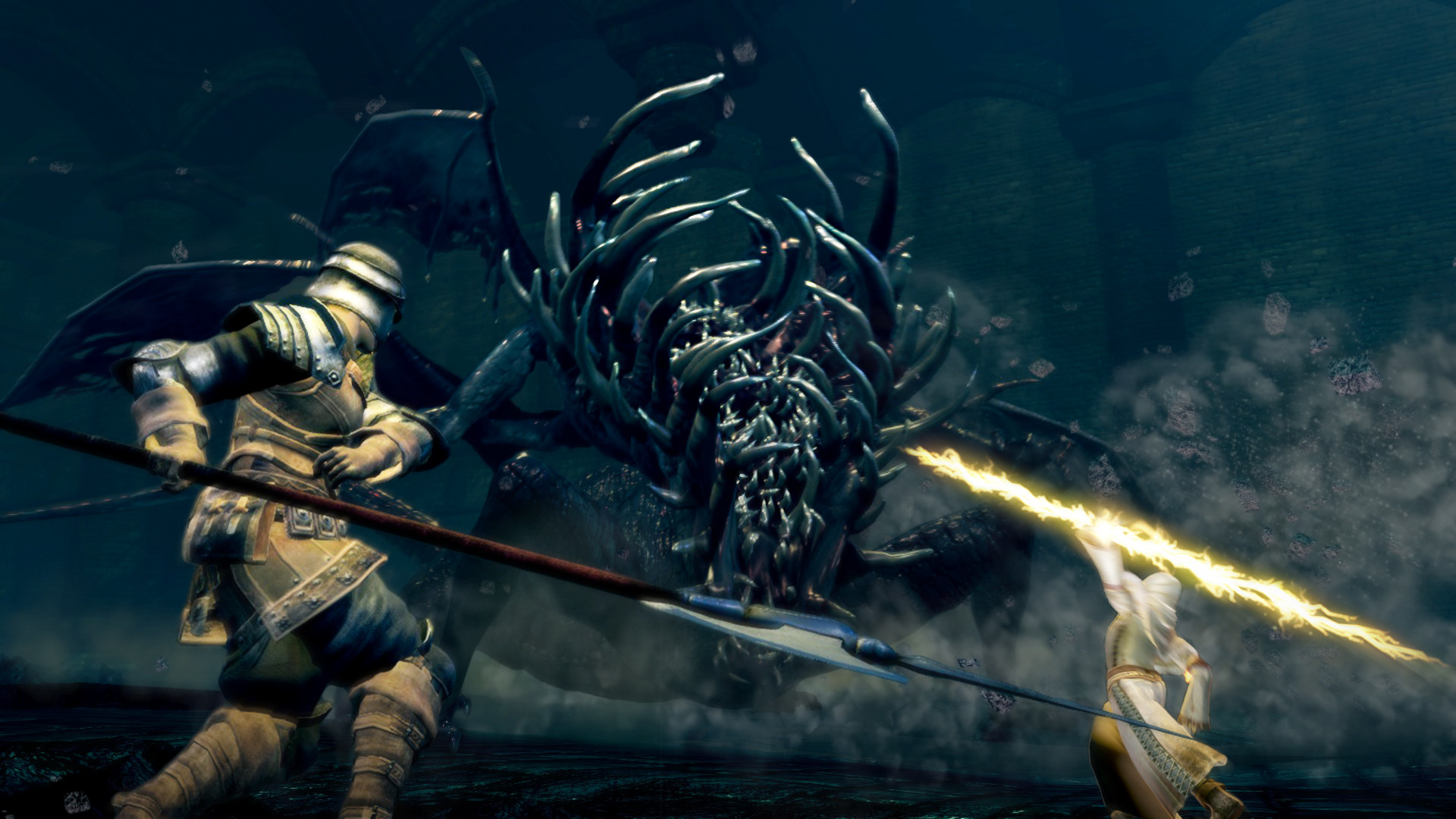
None of this has anything to do with being difficult, other than to say—life is difficult.
The bonfire, as a hub, is really an empty public house of sorts. You have only yourself and a glass of Estus to refill. And you can’t stay there forever. All the pain, or jubilations, from your previous exploits live on with you here. This is where our souls end up, you see? The full measurement of ourselves. The people we lose in the battles we shared, they end up here too, to palaver with all the other ghosts of adventurers that also could not escape the cycle. Resting solitary, unable reach out and touch one another. Or hear one another. It’s sad.
Indeed, there is a sick, purveying madness contained within the loop of loneliness at the bonfire. People sit down to celebrate. And they rest to recover. Alone. All the good and bad of the previous encounter’s events are transitory. Everyone returns to where they started before things went bad. Or good. We are steeled by the comfort in knowing that when we lose someone that this is where they will always end up. Perhaps they sat wondering if you had completed what you began together? They will never really know the result, of course, but that is life.
And that, too, is Dark Souls. Or rather, it was.
…And Only Dark Will Remain.
There is a hard truth in there somewhere. But a harder truth would follow even still. Sequels began to be released. Perhaps it was inevitable. Dark Souls had been something of a sequel itself after all. First came Dark Souls II; later, Dark Souls III would also arrive. And from these releases a fissure would begin to form, and dissonance would take root. The marketing of Dark Souls led directly into the worst parts of Dark Souls II, and eventually headlong into Dark Souls III. “Prepare to Die” became overhyped, memed, and transformed into all that would follow in FromSoftware’s wake in subsequent years. There have been exceptions to that. Bloodborne was excellent, sure. But it wasn’t anything approaching the event that had preceded it. What I saw from Dark Souls was something more: a prophetic allegory on what it means to lose one’s soul. I wanted more of that theming, naturally. What so many more consumers (allegedly) wanted from Dark Souls was just a very hard game, with an even harder reputation. A chance to “Git Gud”— and unfortunately, the developers agreed. They saw it too, alright. And the money. And they had to make good on that.
Dark Souls’ sequels had become the original Souls-like.
There was no denying it. Souls had become more famous for its difficulty than its narrative complexity. There seemed to arise a misunderstanding regarding what it had really been about. Even from those who had created it. Perhaps it was me, even? After all, I could have been mistaken myself. But how can something be so accidentally perfect? My expectations were too high, perhaps, but I had FromSoftware’s previous work to go on. There was evidence for hope. But soon that was all gone. Replaced. What Dark Souls had been was suddenly stripped, distorted, over-marketed, sold, repackaged, over-produced, sold again, and then finally, made almost unrecognizable. Or too recognizable in the second sequel’s case. And difficult! Don’t forget that. That is what makes a Souls game a Souls game, apparently, to a whole host of fans. Equal parts difficulty and convolution. Nothing needs to make sense anymore. It just needs to exist and be difficult. Or rather, it just needs to remind us of things that used to make sense. Dark Souls III loved doing that…
“Here is Solaire’s armor to wear!” “Why?” “Because you like Solaire!” “But that doesn’t make sense. Solaire is gone and he made his armor himself.” “Solaire we said!!!” “But you also said—” “SOLAIRE!!!”

These sequels were nothing short of imposters. Even if they stood out as decent games on their own, they were still merely competent reconstructions of what someone thought Dark Souls was. But the veteran is wiser, knows better. These were all the same, yet totally different. It is a paradox, of course, to say that both Dark Souls II and III are both too similar and too different from what preceded them. But it’s accurate. They are both simultaneously Dark Souls games and also only something vaguely resembling it.
The first sequel had a posturing problem. The story was vastly different, but the objectives were nearly identical. As before, the player will spend time looking for a way to kindle the first flame. Again. This was a terrible idea and only served to expose the complete dearth of reasons for having a sequel. If our hero is to complete the same tasks as before, then it forces the player, particularly one who loves the lore, to draw direct comparisons to the original—since the quests’ ultimate goals are so similar, how could you not?
Dark Souls II understood the appropriate concepts, but it didn’t know how to articulate them. At a base level, it strove to keep things open-ended and vague so that players would inevitably reward themselves through their own discoveries. The issue was that, also on a base level, the stories being told in Dark Souls II were simply not as compelling. There was such a distance, both chronologically and geographically. And yet, it still resisted wading too far and kept its training wheels firmly attached. It feels different, yet never made an argument for existing that the original did not already make. It would tell you to kill lord bosses (again), bring their souls all together (again), open a door (again) that leads to a kiln (again), and rekindle a flame (again).
Where is the elegance in that? If it should be purgatory, then why did I ever leave that original bonfire? It feels like an emulation rather than its own commodity. Even during Dark Souls II’s finest moments of design, story, and gameplay, it never shakes the feeling of being phony. A mad lib. However well-intentioned. Down to the enemies you face….
“You fought a woman-spider in the last one. So…,” Dark Souls II reasoned, “…you shall battle a man-scorpion this time!”
A solid why for it is almost omitted entirely. As if The Chaos Witch Quelaag being half-spider and half-woman was what made her interesting? How utterly devastating. How utterly wrong.
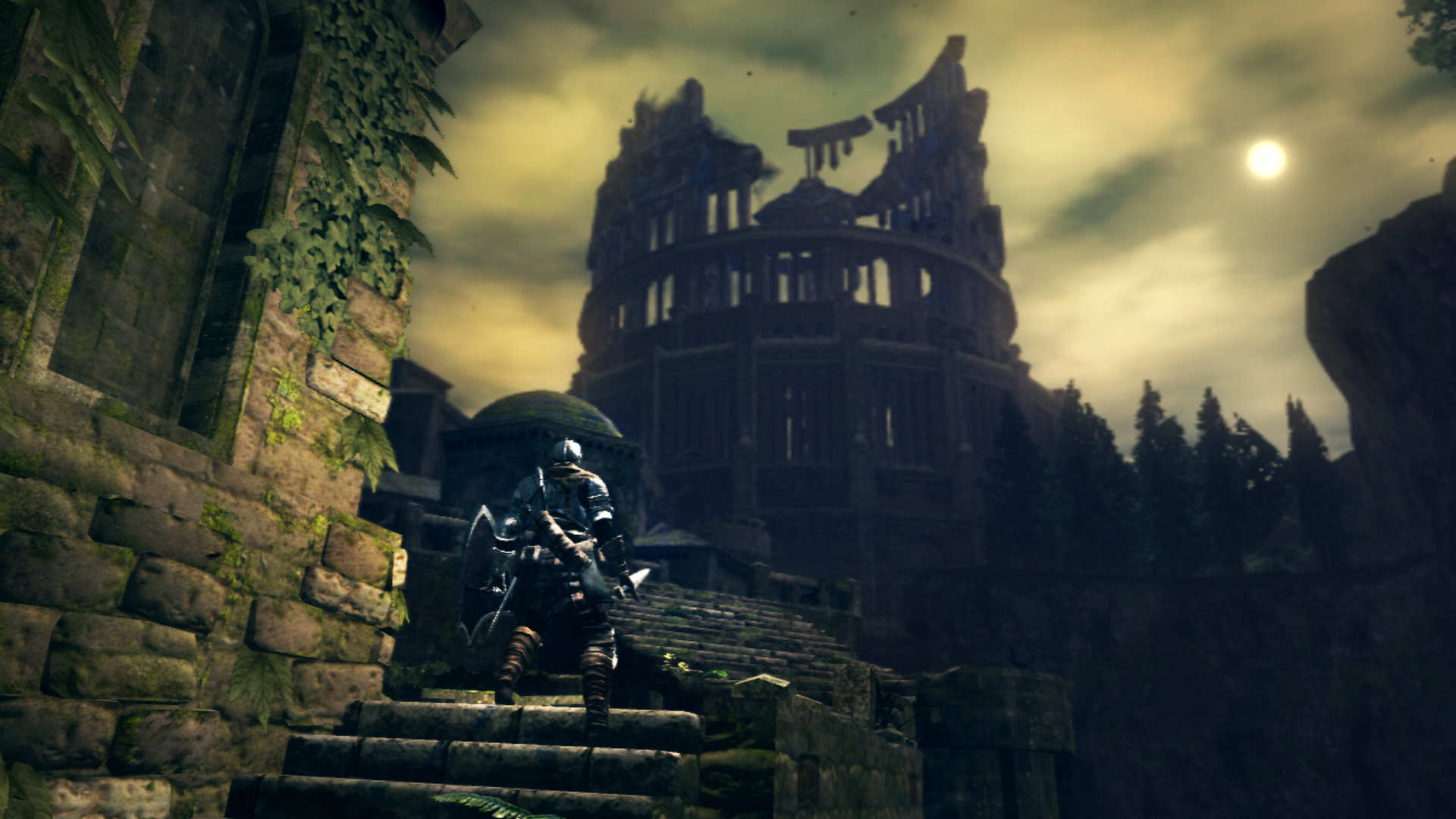
Alas, Dark Souls III would be no savior. In many ways, it’s the most troubling entry of the series. By the time it had arrived, Dark Souls creators had decided the solution to the Dark Souls II uproar was (aside from doubling down on the difficulty) to just bring back everything. Previous characters, voice actors, locations, items, and story-beats all made a rather confusing return. Aside from being emotionally manipulative, it was almost certainly a hard overcorrection. At times it felt like a prequel to the second one, and a sequel to the first one. Which makes no sense, of course. The sheer amount of laziness or ineptitude felt insulting. Things only worked logically if you squinted. Hard. Or ignored them altogether. (I’m so sorry, Havel…)
Nothing but straw-grasping for the lore-hunting community remained. Gone were the players interested in the world and level design. The philosophical debates or lessons on humility ceased. Everything just sort of faded away. And all that was left were recycled memes and recycled characters.
“But… we did have new combat stances!!!”
It’s nice that Dark Souls III cared about answering open-ended questions remaining from its progenitors, but it’s also a shame most of them feel hackneyed or meaningless. How does a lore master deal with poor answers to great questions? Where is the romance in that? At least Dark Souls II tried at something and failed. Dark Souls III is a retread. A more adept pretender, perhaps. But completely uninspired.
Even Now There Are Only Embers…
Maybe Dark Souls died by 2016? If for no other reason than how comfortable it became with redundancy. And difficulty.
The actual difficulty of Dark Souls was something that had never really daunted me. After the initial fear of losing progress abated, the struggle was inevitable. You just deal with it. It was part of the story it was telling. If Dark Souls had been easy, the fire would have been linked way before I and many like me had entered The Kiln. “You are not the first” would have no meaning. Are they difficult? Yes. But Dark Souls had originally justified its difficulty by leveraging it with the story. As The Chosen Undead, it is impressed upon you that you will die often. The more you die, the more you hollow. The game uses the frustration that other players experience (by dying often), and eventually quitting (going hollow), for storytelling purposes. In 2011, it was sophisticated and novel. It didn’t exist by 2016—and certainly doesn’t now. Without the same justifications for extreme difficulty, the sequels lost their reasons for creating situations in which the player will struggle. Other than, of course, the sole reason of its reputation. It is a selling point. Not a lore point. We have long since passed that stage. Dark Souls became victim of its own marketing.
I don’t play these games because of the challenge, or the builds, or the memes. That is only part of it—granted, a fun part of it. But it requires more to be more. And based on the massive cult following some Dark Souls lore masters (EpicNameBro, Bonfire Side Chat podcast, Vaatividya, etc.) garnered, I was not the only one. Look, no one makes a career out of producing Dark Souls video content, or a years-long podcast, just because it’s a hard video game. There’s nothing special about that. As such, there is a noticeably clear, fundamental disconnect between what made this series so popular and what began sustaining that popularity. If the difficulty or PVP was solely what the Dark Souls experience was about for you, that’s fine. No one will ever deny you that. It is hard to imagine any potential new Dark Souls game, or any new Souls-like, ever not being worth your time and money. They’re literally banking on it. Well-made games with high degrees of difficulty are easier to produce than Dark Souls. That’s why we’ve had nothing like it since 2011.
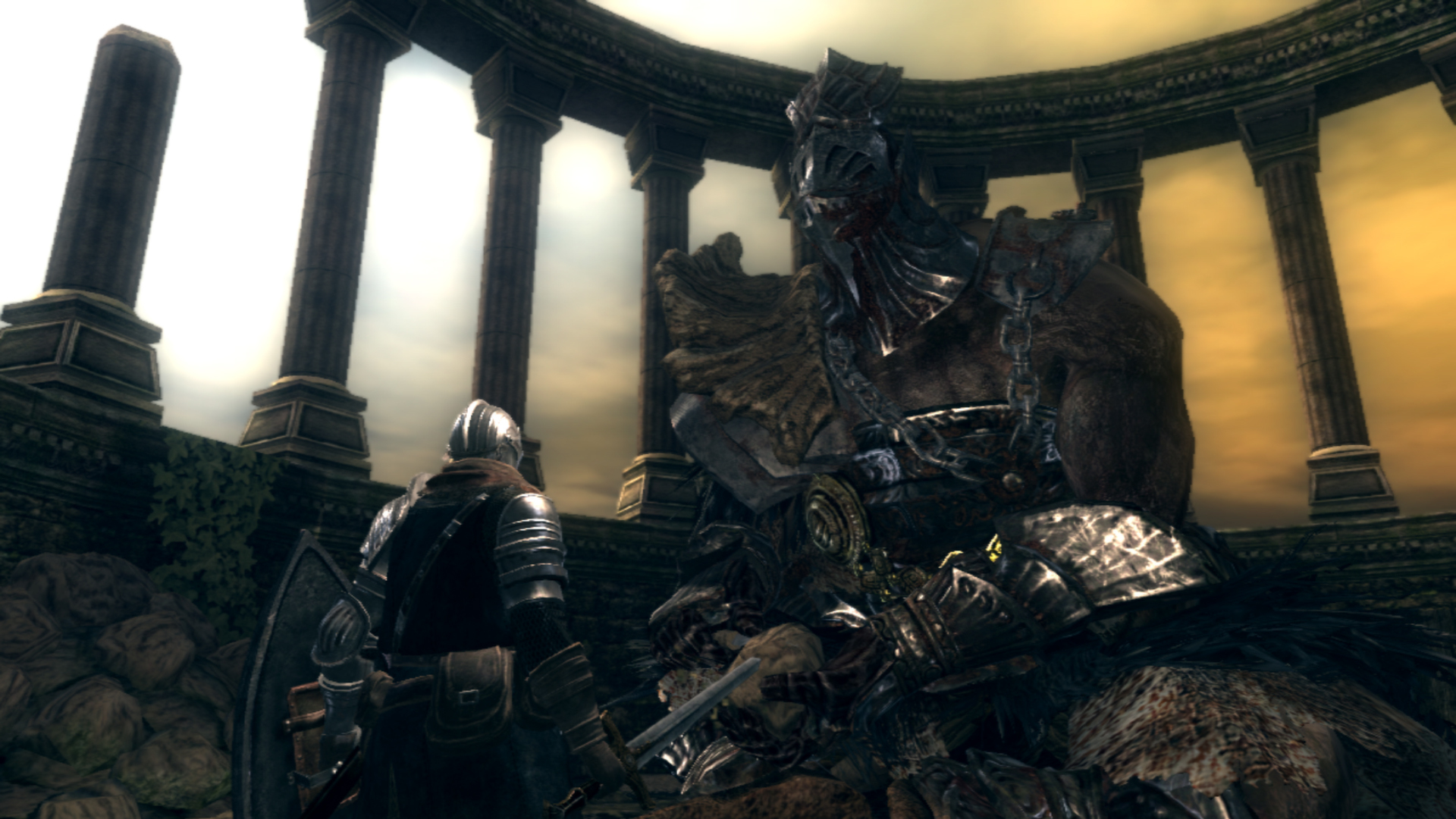
For some of us, though, Dark Souls was so much more. It was about the pursuit of knowledge at all costs (“Big Hat” Logan), the silence of God (Solaire of Astora), the fear of failure stunting our growth (Siegmeyer of Catarina), and countless other concepts that have the potential to shape worldviews. Dark Souls sought the type of catharsis that only a video game can provide. You are the player. You are in control. You are either the next hollow or you are The Chosen Undead. The crux of which may rest upon your next input.
With no future Dark Souls games yet announced, a former fan is stuck only looking back. Had the original release been an accident? Was that sideshow freak really an accidental perfect storm of design, gameplay, and storytelling? Or could it have been that the financial demand superseded the intellectual capacity of the creator? It’s true it that it would have been staggeringly difficult to pull something off like that second time, let alone thrice. But the demand was there, and that demand needed to be satisfied. And, with that, it really should come as no surprise that after FromSoftware (or specifically, Hidetaka Miyazaki) stepped away from Dark Souls, the results have been more highly regarded; Bloodborne and Sekiro: Shadows Die Twice both hold higher overall Metacritic scores than Dark Souls, Dark Souls II: Scholar of the First Sin, and Dark Souls III. Metacritic is flawed, of course. I have no love for Sekiro. But it’s notable. There may be something to it.
…And Man Sees Not Light…
All that remains for Dark Souls feels quite different. It lost something of its character, only shortly after it had acquired it. Its shell has grown gaunt and tight. Almost cadaverous. It listlessly carries on through the world for the masses to engage with it along the way. But it’s only a shadow. A spindly zombie of sorts. Something only kept alive by profit and fluff. It doesn’t seem bothered to evolve, to innovate. Or really even to do what it had already done best. Why would it? It accomplished what it needed to. More even. It’s become a commodity. An artifact representing a pinnacle, but also having long since lost the shine and luster that would normally accompany the honor.
It moved slower and slower, then it stopped. Perhaps comprehending what it’s done. But it will never do it again. It can’t. It won’t.
It’s hollow.
There’s nothing left for it now. Nothing more to do. Nothing more to accomplish. Nothing…
…But Only Endless Nights.
